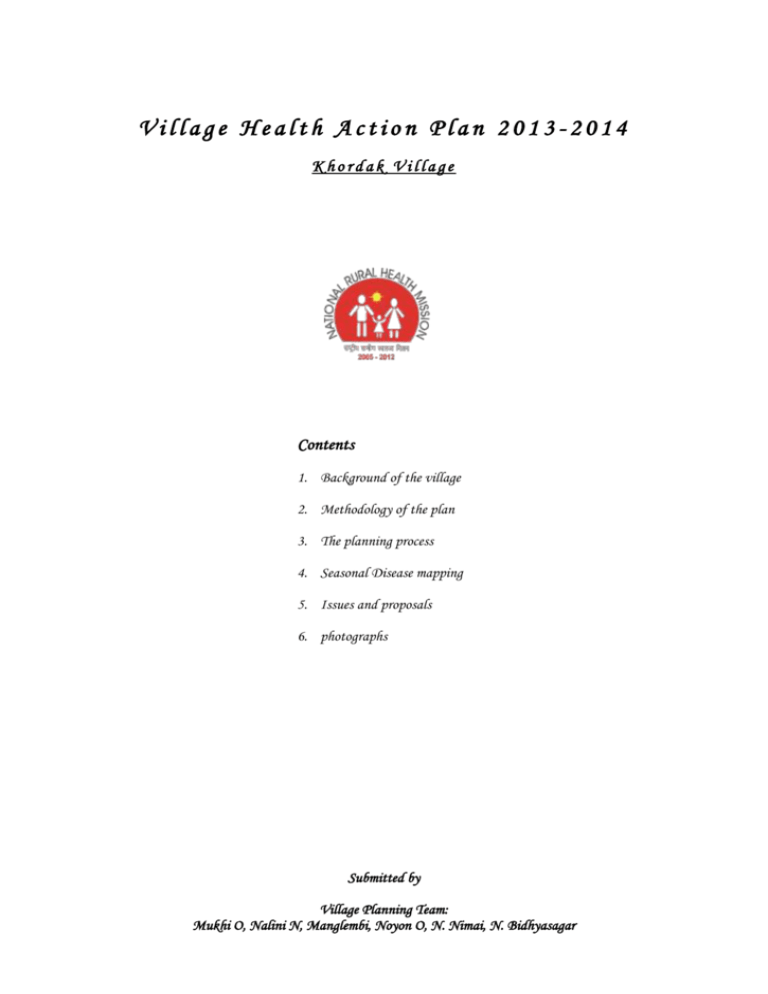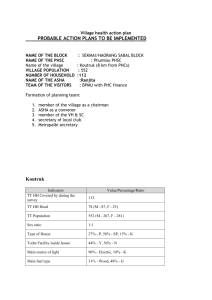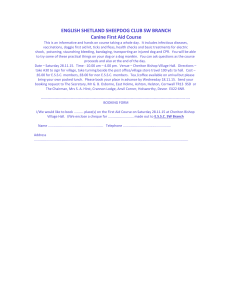Khordak village
advertisement

Village Health Action Plan 2013-2014 Khordak Village Contents 1. Background of the village 2. Methodology of the plan 3. The planning process 4. Seasonal Disease mapping 5. Issues and proposals 6. photographs Submitted by Village Planning Team: Mukhi O, Nalini N, Manglembi, Noyon O, N. Nimai, N. Bidhyasagar An outlook into Khordak village Khordak village inhabited by Meitei community is under the catchment area of PHC Sekmaijing, located at a distance of 28 km from PHC Sekmaijing and 62 km from Imphal. The village is at the reach of the motorable road however at present the roads are not blacktop and in a back condition. The village does not a transport service either Govt. or Private and the nearest SC which is at a distance of 10 km is PHSC Laphupattera. The village land is stretch on a distance of 7 km from one end to another on the riverside of Khordak reiver and the landscape of the village is surrounded with lake dissected into numerous fish ponds which server as the source of income to the villages. Background of the Village The total population of Khordak village based on the figures provided by the AWW and one elected member called, O. Noyon Devi is placed within 900 to 940. The total number of House hold is 100. The village has 3 (Three) AWC and all the houses in the village are of Kacha type. 95% of the houses has sanitary latrine and the main occupation depends on agriculture and fish farming. The sources of drinking water are pond & river. There are about 10 persons engaging in government Job. Methodology of the Plans The planning process follows a bottom up approach with VHAP team at the bottom level. The BPMU, Wangoi block ensure that the VHAP activities are carried out correctly & appropriately in depth within the timeframe. The VHAP team then submits the finished draft to the BHAP team which is then carried forward by the BHAP team for further verification and inclusion of vital information in the BHAP. The BHAP team compiled each of the draft submitted by different VHAP team within the block and form up a BHAP 2013 -14 to be finally submitted to the District Health Mission Society, Imphal West. To actualize the VHAP 2013-2014 and to bring out a comprehensive plan, the following tools were taken into consideration: 1. 2. 3. 4. Various indicators from HMIS. Basic village information. Drawing a social mapping of the village. Charting out a conclusive seasonal disease mapping. Being facilitated by the BPMU, Wangoi block, the whole planning process at the village level took 9 days to complete the plan. The facilitators are advised by the Block Nodal Officer on BHAP team to make three visits. The Planning Process The orientation of VH&SC of the village was done during the planning process of Village Health Action Plan. In the village three visits were made. During the first visit a detail briefing was made on the goal of the VHAP with respect to the village, creation of social mapping, finalizing seasonal health calendar and explanation of the households’ survey and starting the process. The second visit was meant for collection and analysing the findings of the Survey and develop a concrete structure of the VHAP. The last & final visit was utilized for sharing and finally submission of the finished draft after endorsement to the Block Planning Team. A gap of two days was maintained between each of the visits to the villages. Village Social Mapping Seasonal Disease Calendar - Khordak village Name of the Disease Jan Feb Mar Apr May Jul Aug Sep Oct Nov Dec Fever Cold Diarrhea Jun Jaundice Scabies SmallPox Diarrhoea Log frame for VHAP Issues Causes Proposed activities Responsibility Timeline Source of budget Seasonal disease like , diarrhoea, Fever, Conjunctivitis, Skin Disease ect Unreached area of Health care service Awareness programme and health talk VHC 1st ,2nd and 4th Quater Untied fund No community toilet Unhealthy sense on environment Construction of Community toilet VHC 1st Quater VHC No proper source of drinking water Unavailability of safe drinking water supply Provision of safe drinking water VHC 1st Quater PHED Immunization Unreached service Immunization session to be held once in a monthly at a identified location PHC Sekmaijing & VHC Every month DHMS Lack of overall health care services Non availability of Selection of ASHA SHMS ASHA NA NA Lack of awareness on Maternal & Child care Village not easily accessible RCH camp DHMS Every qtr DHMS Transportation Lack of Public transport system Identification of assured vehicle for transportation DHMA On a regular basis DHMS Snapshot







